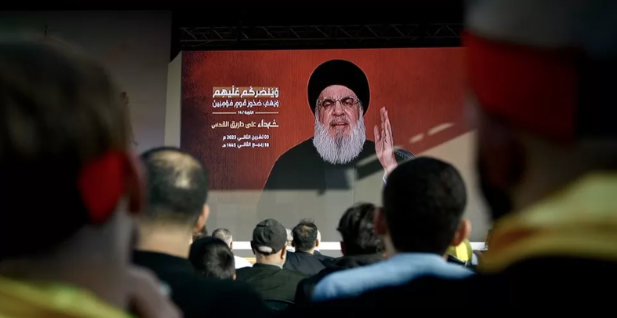Israel
Hezbollah’s Stand in Israel War Sparks Tension in Beirut

Amid the sweltering Lebanese landscape, where each day is marked by the heat’s relentless assault, the words of Hassan Nasrallah reverberate with the ominous undercurrents of the Israel war. As Nasrallah skirts the line between provocation and the declaration of outright conflict, the Middle East teeters on the brink, still bleeding from recent skirmishes and fearful of plunging into further violence.
In Beirut, a city all too familiar with the ravages of war and now grappling with economic collapse, the prospect of renewed hostilities with Israel hangs heavy in the air. Citizens hold their breath, the devastation of the 2006 conflict lingering as a grim cautionary tale, an enduring testament to the high stakes of regional strife.
Lebanon’s storied history with its southern neighbor is a patchwork of frayed relations and violent engagements, each leaving behind a legacy of suffering and resilience. The shadow of past wars looms large over the current discourse, a silent testament to the cycle of conflict and uneasy truce that has characterized this volatile borderland.
In this landscape, Hezbollah emerges—a state within a state—wielding influence that stretches beyond Lebanon’s borders. Nasrallah’s Hezbollah, painted by some as the sword arm of Iran’s regional ambitions, remains a potent force, a key player in the geopolitical chess game of the Middle East.
In the shadowy enclaves of Beirut’s southern districts, where the words of Nasrallah resonate with a gravity that transcends oratory, the Lebanese narrative unfolds—a tapestry of resilience laced with an intractable sense of foreboding. Here, the relentless drumbeat of conflict does not just ripple through the air; it reverberates through the very sinews of society, where support for the Palestinian cause is as deeply ingrained as the fear of bloodshed yet to come.
Ali, a local mechanic whose hands bear the indelible marks of toil and the grime of engines, captures the essence of this weary anticipation. “The scent of war lingers, akin to a tempest looming at the brink of our skies. We are wearied souls,” he confesses. His words, steeped in the fatigue of a people who have courted the specter of war for too long, echo a sentiment that is as much about kinship with their Palestinian brethren as it is about the visceral dread for their offspring’s future.
The environment of these suburbs, marred by the scars of past conflicts, has shaped a community adept at navigating the tides of uncertainty. From the bullet-pocked walls to the defiant murals that adorn them, every surface tells a story of defiance and the longing for a peace that remains elusive. The people here, like Ali, possess a profound understanding of survival, one that is not learned but inherited, passed down like a somber legacy from one generation to the next, etching a chronicle of hope and despair onto the heart of the Levant.
Nasrallah’s address to the throngs of his followers, dispersed and keenly attentive, was a masterclass in strategic ambiguity. His words, carefully chosen, left a door ajar to the possibility of military escalation, tied intricately to Israel’s posture towards Gaza and Lebanon.
The recent surge in cross-border hostilities is a testament to Hezbollah’s capacity to pressure Israel, a reminder of the fragile peace that governs this tense boundary. Yet, it remains a pressure tactic, not an outright descent into war—a strategic choice by Nasrallah, understanding that Lebanon’s fractured society and economy can ill afford another destructive conflict.
Nasrallah’s claims of non-involvement in Hamas’s operations pose a riddle wrapped in the enigma of regional alliances. The assertion that the 7 October attacks by Hamas were a solitary venture seems to challenge the perceived synchrony of purpose between these two groups.
This stance raises questions. Is it a genuine disassociation or a calculated dissemblance, designed to veil the true nature of Hezbollah’s involvement in the Palestinian struggle?
Imagine the scene: a sea of faces under the sweltering Beirut sun, expressions mingled with conviction and concern. On a rooftop, a lone figure watches, a bulwark against unseen threats, while below, chants of allegiance rise like a fervent prayer.
This is the bastion of Hezbollah, a place where fervor for the cause runs as deep as the scars of past conflicts. Here, the narratives of terrorism, as labeled by many in the West, collide with the tales of resistance celebrated by supporters.
The calculus of war is an ever-changing equation, where today’s decisions are tomorrow’s history. For now, Hezbollah’s stance is one of watchful reservation, leaving the burden of the Gaza confrontation on the shoulders of Hamas. Yet, the potential for a dramatic shift looms ever-present, should the scales of battle tip too far in any direction.
In the alleys of Beirut, where the ghosts of past conflicts whisper warnings, the hope for peace remains a fragile dream. The final question that lingers, as the dust of Nasrallah’s words settles, is not just when the drums of war will sound, but whether the echoes of peace have a place amidst the cacophony of the Middle East’s enduring strife.













You must be logged in to post a comment Login